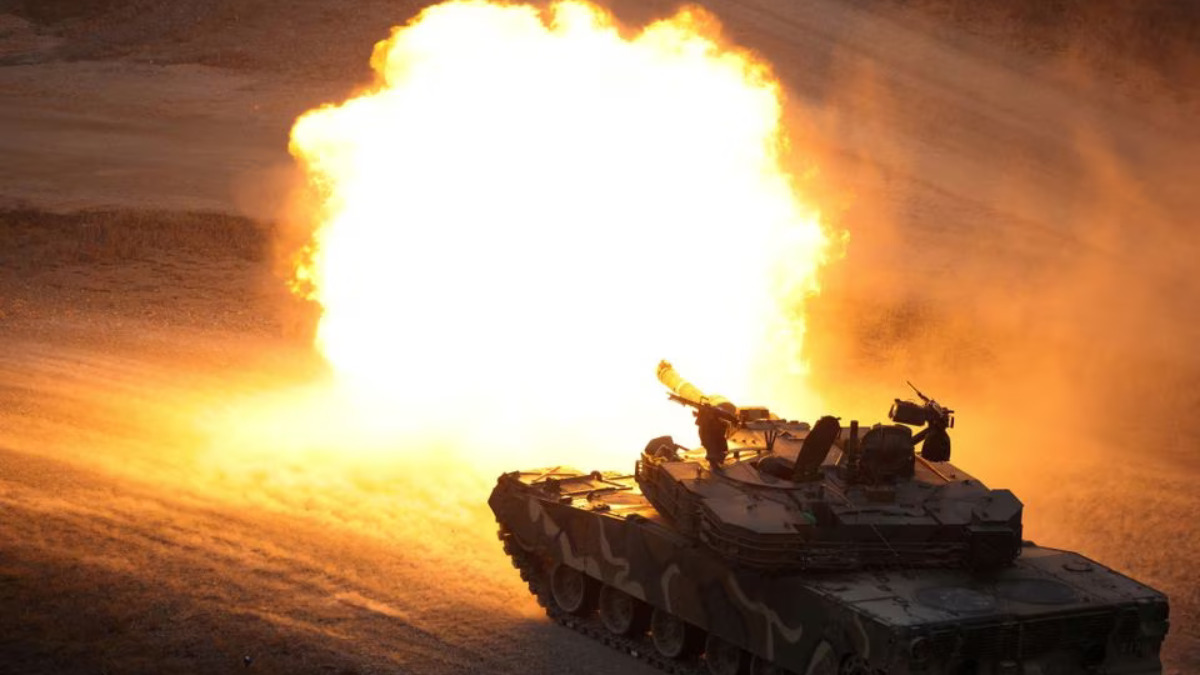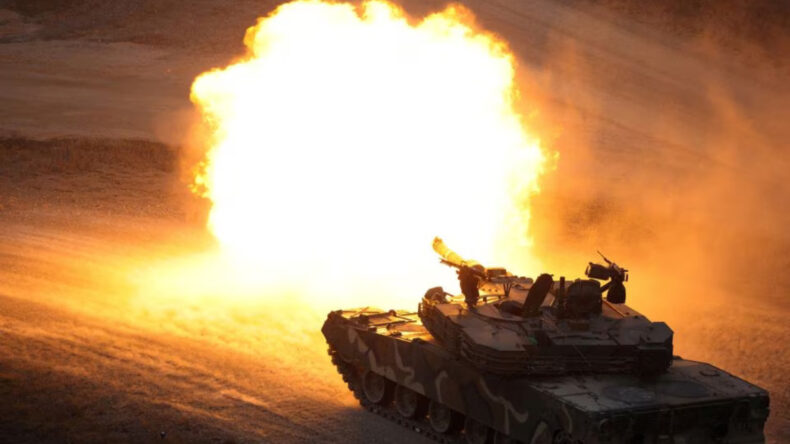There is a significant issue that is often overlooked when assessing global emissions—the emissions produced by the world’s armed forces. As global temperatures continue to rise, scientists and environmental organizations are increasing their efforts to urge the United Nations (UN) to require militaries to disclose all of their emissions and eliminate a longstanding exemption that has allowed them to exclude certain climate pollutants from official records.

Militaries are one of the largest consumers of fuel worldwide and are responsible for approximately 5.5% of global greenhouse gas emissions, as estimated by international experts in 2022.
International climate agreements do not impose any obligations on defense forces to report or reduce their carbon emissions. Moreover, scientists and academics argue that the data published by some militaries regarding their emissions is often unreliable or incomplete.
This situation arises because military emissions occurring outside of a country, such as those from aircraft flights, naval operations, and training exercises, were not included in the Kyoto Protocol of 1997, which aimed to reduce greenhouse gas emissions. Furthermore, these emissions were once again exempted from the Paris Agreement of 2015. The reasoning behind this exemption was that disclosing energy usage data related to military activities could potentially compromise national security.
Environmental organizations like Tipping Point North South and The Conflict and Environment Observatory, along with academics from reputable British universities such as Lancaster, Oxford, and Queen Mary, are actively advocating for greater transparency and comprehensive reporting of military emissions. They are employing various methods such as research papers, letter campaigns, and conferences to advance their lobbying efforts.
According to a campaigner who monitors the research, there has been a significant increase in the publication of peer-reviewed papers on this topic. In the first five months of 2024 alone, at least 17 such papers were published, which is three times the number published in all of 2022 and more than the combined total of the previous nine years.
These groups also wrote a letter to the United Nations Framework Convention on Climate Change (UNFCCC) in February, urging the UN’s climate body to include all military emissions in order to ensure comprehensive global carbon accounting.
The groups emphasized that considering the urgent nature of the climate emergency, it is no longer acceptable to overlook military and conflict-related emissions within the UNFCCC process. They stated, “Our climate emergency can no longer afford to permit the ‘business as usual’ omission of military and conflict-related emissions within the UNFCCC process.”
The issue of emissions accounting will gain prominence during the first global stocktake, which is an evaluation of countries’ progress towards the goals outlined in the Paris Agreement. This stocktake is scheduled to occur at the COP28 climate summit in the United Arab Emirates, commencing on November 30.
Axel Michaelowa, a founding partner of Perspectives Climate Group, highlighted that the exclusion of conflict-related emissions from the UNFCCC accounting is a significant gap. He added that there could be hundreds of millions of tons of carbon emissions that are currently unaccounted for.
Recovery and Peace
At present, there is little indication that the lobbying efforts will yield any substantial action this year. The UNFCCC stated in an email that they currently do not have specific plans to revise the guidelines regarding military emissions accounting. However, they acknowledged that the matter could be addressed in future conferences, potentially including COP28 in Dubai. When asked about discussing military emissions at the U.N. summit, the UAE presidency mentioned that one of the thematic days during the two-week event would focus on “relief, recovery, and peace,” but provided no additional information.
There are indications that certain militaries are preparing for upcoming changes in reporting requirements, and some are taking steps to reduce their climate impact. NATO, the Western security alliance comprising 31 countries, has developed a methodology for its member states to report their military emissions, according to statements provided a online news agency.
Countries like New Zealand are considering including previously excluded areas, such as emissions from overseas operations, in their reporting. Similarly, defense officials from Britain and Germany are looking into addressing ambiguities in their reporting. Additionally, the United States sent representatives from the U.S. Army and Navy to the COP27 climate summit in Egypt last year, marking the first time a delegation from the Pentagon participated in the global climate summit.
Meredith Berger, the U.S. Navy’s Assistant Secretary for Energy, Installations, and Environment, stated that the U.S. military’s participation in the COP27 climate summit indicated their acknowledgment of being significant emitters of fossil fuels and energy. There have been noticeable reductions in the U.S. military’s oil consumption and emissions.
According to the U.S. Defense Logistics Agency, which manages oil procurement, oil purchases in 2022 amounted to 84 million barrels, showing a decline of nearly 15 million barrels compared to 2018. Additionally, emissions decreased from 51 million tonnes in the previous year to 48 million tonnes in 2022.
It is worth noting that the figures reported to the UNFCCC by the U.S. Department of Defense included all emissions but excluded international transport and bunker fuels from the calculations.
More Drones
According to Neta Crawford, an Oxford University professor of international relations, several factors have contributed to the reduction in fuel consumption and emissions by the U.S. military. These include the withdrawal of troops from Afghanistan and Iraq, the adoption of renewable energy technologies, the use of more fuel-efficient vehicles, and a decrease in the frequency and scale of military exercises.
The increased utilization of unmanned aerial vehicles, or drones, may also have played a role. An anonymous senior U.S. defense official stated that drones have been one of the most significant technologies for reducing emissions. By removing human operators from aircraft, energy performance is significantly improved.
Advocacy groups lobbying the United Nations to remove military exemptions from emissions reporting highlight the significant increase in emissions associated with the conflict in Ukraine as a compelling reason for the change. According to Deborah Burton of the environmental organization Tipping Point North South, the Ukraine conflict has drawn considerable attention to the issue, unlike previous conflicts.
A report by Dutch carbon accounting expert Lennard de Klerk estimates that the first year of the war in Ukraine will result in a net increase of 120 million tonnes of greenhouse gases, which is equivalent to the annual emissions of Singapore, Switzerland, and Syria combined.
Furthermore, academics from Oxford and Queen Mary University of London are organizing a conference on military emissions in Oxford on September 26. The conference aims to generate new research that could contribute to informing changes in reporting requirements.
The spokesperson for Ukraine’s environment ministry expressed support for these efforts and stated that they would seek support from governments at COP28 to endorse more transparent reporting of military emissions.
‘Free Rides’
Climate activists have been increasingly concerned about the emissions generated by military activities, particularly in light of the Ukraine war. However, some experts argue that this focus on military emissions could divert attention away from addressing regional security concerns and potentially hinder discussions in the short term.
NATO’s James Appathurai emphasizes the complexity added by the Ukraine crisis, suggesting that it complicates the issue further.
Certain military entities argue that disclosing their fuel usage would provide insights into their overseas operations, which they consider sensitive information. Markus Ruelke from the German defense ministry’s environmental protection unit expresses concerns about revealing details such as fuel consumption, flight distances, driving distances, and exercise patterns.
The United Nations Framework Convention on Climate Change (UNFCCC) acknowledges that some military emissions are categorized as unspecified fuel combustion in its reporting tables.
Stuart Parkinson, the executive director of Scientists for Global Responsibility, points out that global military emissions are poorly understood. He criticizes the discrepancy between urging individuals to reduce their carbon footprint through measures like flying less or switching to electric cars while the military’s emissions are not being adequately addressed.
In summary, while climate activists are increasingly focusing on military emissions, experts argue that this could distract from addressing regional security concerns. Some military entities are hesitant to disclose fuel usage details due to the sensitive nature of their operations. The current reporting methods make it difficult to fully grasp the extent of military emissions, raising concerns among environmental advocates.












